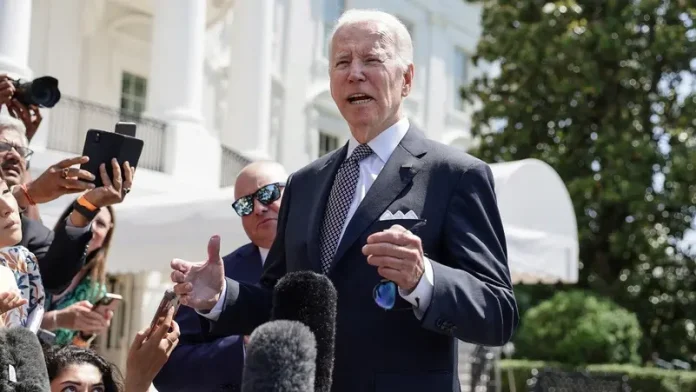Oil prices rose as the market braced for the potential Israel’s retaliation against Iran for its recent missile strikes may include attacks on the country’s oil industry.
When asked by a reporter if he would support Israel targeting Iran’s oil facilities, Biden responded, “we’re discussing that.” This statement fueled market fears of potential disruptions to oil supplies from the region. Additionally, Biden indicated that he did not expect Israeli retaliation against Iran to happen on Thursday.
West Texas Intermediate (WTI) crude futures (CL=F) surged as much as 5.5%, approaching $74 per barrel, following comments by President Joe Biden.
According to a report, Oil prices have surged as the market braced for the possibility that Israel’s retaliation against Iran for its recent missile barrage will include strikes on the country’s oil industry.
When recently asked by a reporter if he would support Israel targeting Iran’s oil facilities, President Joe Biden responded, “we’re discussing that.” This statement fueled market fears of potential disruptions to oil supplies from the region. Additionally, Biden indicated that he did not expect Israeli retaliation against Iran to happen on Thursday.
West Texas Intermediate (WTI) crude futures (CL=F) surged as much as 5.5 percent, approaching $74 per barrel, following comments by Biden.
“The fact that energy infrastructure is now considered a potential target isn’t entirely surprising to the market, but hearing comments from Biden about it brings the possibility closer to reality,” Rebecca Babin, senior energy trader at CIBC Private Wealth, told Bloomberg. “There has been some skepticism around whether Israel would actually target oil facilities, largely due to the influence of the Biden administration, which is keen on keeping oil prices stable ahead of the upcoming elections.”
The Middle East produces roughly a third of the global oil supply and traders are concerned that the latest escalation in the region plagued by war and conflict for the past year could affect the flow of oil if energy facilities are hit or supply routes are obstructed.
On October 7, 2023, Hamas, a Palestinian militant group, launched a deadly surprise attack on Israel, killing roughly 1,200 people and taking some 250 hostages. About 100 hostages remain in captivity, around 65 of whom are believed to be alive. Israel subsequently launched an operation in Gaza which has killed over 41,000 Palestinians so far, according to the local health ministry.
Fighting has expanded past Gaza as Israel fights against Iran and its proxies such as Hezbollah in Lebanon and the Houthis in Yemen. While attacks have been launched from all sides in the past year, fighting has gotten more intense after the electronic device attacks on Hezbollah last month killed dozens and injured thousands more. Israel is widely thought to have launched the attack, but it has not taken responsibility for it.
On Tuesday, Iran hit Israel with nearly 200 missiles. Almost all of the strikes were intercepted, but the explosions that were heard from Jerusalem to the Jordan Valley sent people across Israel into bomb shelters. One Palestinian in the Israeli-controlled West Bank was reported killed and two Israelis were injured by falling shrapnel and debris that also caused damage to the area, according to The Times of Israel.
READ ALSO:
Israeli forces bomb institute for orphans in Gaza, injuring several
Iran’s barrage followed Israel’s limited ground incursion into southern Lebanon overnight from Monday into Tuesday. Israeli Prime Minister Benjamin Netanyahu warned at a security cabinet meeting following the attack that Iran had made a “big mistake tonight” and promised that “it will pay for it.”
Meanwhile, Israeli officials told Axios that Israel will launch a “significant retaliation” to Iran’s recent strikes within days. Many Israeli officials say that Iran’s oil facilities are a likely target but some also say Iran’s defense systems can be targeted or Israel can carry out targeted assassinations.
If Israel carried out a major attack on Iran’s oil facilities could take 1.5 million barrels of daily supply off the market, Citigroup Inc. analysts said in a note on Wednesday that was obtained by Bloomberg.
“Markets have been artificially tightened because OPEC+ is holding something like 6 million barrels a day of spare capacity from the market, and they have a plan to bring it back even if they might keep pushing it back,” Citigroup’s Eric Lee told Bloomberg Television on Thursday.
OPEC+ is a group of 13 OPEC (Organization of the Petroleum Exporting Countries) members and 10 other oil-producing countries that coordinate the output of oil to influence global oil prices.
Lee continued: “With that plan in place, with so much oil potentially overhanging the market, I think it’s capped, provided a bit of a soft ceiling to where prices can go.”













